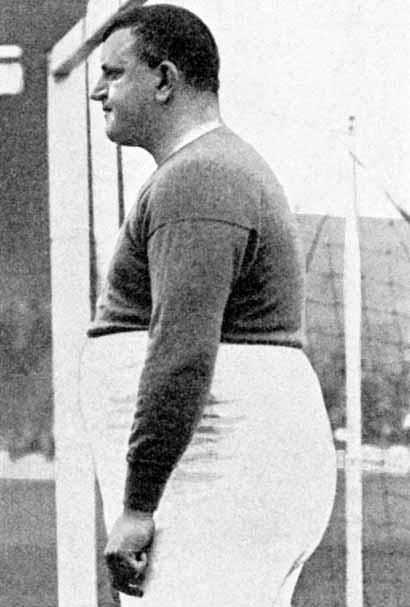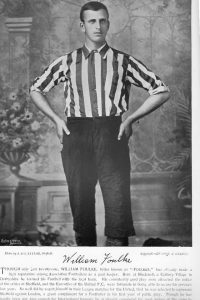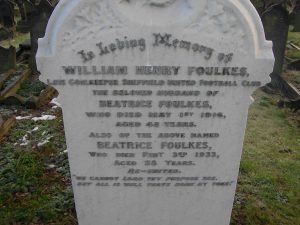WILLIAM ‘FATTY’ FOULKE(S)
By VINCE COOPER
IT has always been said that Goalkeepers are the real characters of football. Stories of eccentricity abound among custodians reminding us of the old adage ‘you don’t have to be mad to be a ‘keeper’ – but it helps.’
Perhaps the first, and still among the most famous, of the character-goalkeepers was William Foulkes, known most often as ‘Fatty’ for obvious reasons, but also by the much kinder nickname of ‘The Colossus’, who graced the game across two centuries. And whilst I’ll make no claims about the mental health of the man whose star shone brightly during the end of the Victorian and beginning of the Edwardian eras, he certainly had many of those traits that make the men who guard the last line of defence different.
Many reports, both from the time and since, reported his name as Foulke but it appears clear from his headstone, pictured below, that there was an ‘s’ at the end. For the purposes of of this article I have kept the name ‘Foulke’ in contemporary reports.
Foulkes was born in Dawley, Shropshire in 1874 and started his working life at the nearby Blackwell Colliery. It was while playing in goal for the colliery works team that he first came to the attention of the public. The Derby Daily Telegraph of September 20 1893 reporting on a local match, included the comment; ‘The feature of the game was the goalkeeping of W. Foulkes of Blackwell who certainly has the makings of a first-class custodian.”
Early days at Sheffield United. Almost svelte!
His reputation quickly spread, helped by a match between Blackwell and Derby County where the ‘keeper had an excellent game and ‘In endeavouring to repel a shot, missed the ball and displaced the two front teeth owned by one John Goodall [a famous England international of the time]’.
These exploits led to County, along with Nottingham Forest, Sheffield United and others all looking to sign the 16 stone youngster of whom it was said ‘He has carried a man under each arm without distressing himself’.
it was United who won the race for his signature when they offered to pay Blackwell £1 per day for the remainder of the 1893-94 season (amounting to £20) and young William joined the professional ranks.
On September 1, 1894, the keeper made his debut for his new club, replacing the legendary Arthur Wharton between the posts. He went on to play in 29 of the 30 games that season and helped his new team to a 6th-place finish.
Foulkes’s reputation quickly grew. A report in ‘Scottish Sport’ commented; ‘In Foulke, Sheffield United have a goalkeeper who will take a lot of beating. He is one of those lengthy individuals who can take a seat on the crossbar whenever he chooses, and he shows little of the awkwardness usually characteristic of big men.’ The legendary C.B. Fry, one of the best-respected players at the time and a noted observer remarked on his build and said of him; “Foulke is no small part of a mountain. You cannot bundle him.”
The big man on England duty
With his team regularly challenging at the top of the table, Foulkes earned international recognition in 1897 when capped against Wales in a 4-0 win. This was to prove to be his only cap however as he could not dislodge the incumbent ‘keeper Jack Robinson, with many at the FA apparently not pleased with some of Foulkes’s antics. A report in the Sheffield Daily Telegraph highlighted the problem, stating. “It is a pity that Foulke cannot curb the habit of pulling down the crossbar,” the report stated, “which on Saturday ended in his breaking it in two”.
“On form, he is well in the running for international honours, but the Selection Committee are sure to prefer a man who plays the game to one who unnecessarily violates the spirit of the rules.’
An intimidating presence
In 1897-98, Sheffield United, led by Ernest ‘Nudger’ Needham captured the championship, and finished with the best defensive record. Foulkes missed just one game and was described by many as ‘the best goalkeeper in the world.’ Forwards tried to intimidate him. According to reports, George Allan of Liverpool ‘charged him’ in one match and the big man; ‘losing his temper, seized him by the leg and turned him upside down holding his head in the mud’. Liverpool were awarded a penalty from which they scored and won the match.
The following season United struggled a little in the league but Bill added to his medal haul with a 4-1 FA Cup Final victory over Derby County and his form remained excellent. The editor of the Athletic News wrote; “His kicking from goal was as mighty as ever, and his good right hand, doubled up, banged out incoming shots with the force of a sledgehammer.”
And his talents weren’t limited to the football pitch. At the turn of the century Foulkes had a short run of appearances with Derbyshire in County cricket. He was said to be a fine batsman and slip fielder with one journalist joking that every time he came into bat; ‘there is an appeal against the light.’
Another Cup Final was reached in 1901 but United were undone by Tottenham Hotspur 3-1 in a replay, after the first match finished all square at 2-2. Foulkes’s performances, even in those defeats, was of the usual high standard. Reports suggested that it was the big man’s heroics that earned the second match and kept the score down to three in the replay.
Weight gain
Foulkes missed the start of the following campaign through injury and it took him a while to regain his place. This wouldn’t have been helped by his ever-increasing weight. After coming into the professional game weighing under 13 stones, the 6ft 4ib Foulkes had by now, ballooned to around 20 stones. When he did get back in the team, it was a quick return to his best form, and he continued to deal with opposing forwards in his own inimitable way. The Athletic News reported; “when forwards try to barge him he doesn’t claim a foul, but simply places that paw of his on the shoulder of the charging gentleman in a most fatherly manner, and pushes him aside with an expression of ‘get on one side little boy’ .” In a Sheffield derby match he fell on Wednesday striker Laurie Bell. “It was really all an accident,” he later recalled. “Just as I was reaching for a high ball Bell came at me, and the result of the collision was that we both tumbled down, but it was his bad luck to be underneath, and I could not prevent myself from falling with both knees in his back. When I saw his face I got about the worst shock I ever have had on the football field. He looked as if he was dead.”
In 1902, United and Foulkes reached a third FA Cup Final with Southampton (including the aforementioned Fry) the opponents. The match, and the ensuing replay, might well have contained the big man’s greatest performances, as well as one particular defining moment.
The first encounter finished 1-1 but Southampton’s equaliser was shrouded in controversy. United led from the 2nd minute but it was only the efforts of Foulkes that kept the Blades in front. Fry, later wrote in Southern Echo; “The outstanding feature of the match was the grand goalkeeping of Foulke. He made a number of good saves, and on two or three occasions cleared the ball from what appeared impossible positions. Once, near the end, from a corner, he effected an absolute miracle with four or five men right on him.”
With two minutes to play, Southampton knocked the ball upfield and it fell to Harry Wood who had been tying his bootlaces and was in an offside position. When the ball came his way, Wood straightened up and ran on to score. The referee, Mr Kirkham consulted his linesman and they concluded that the ball had struck a United defender playing Wood onside.
After the match Foulkes went looking for for the ref, ‘in his birthday suit.’ Linesman J. T. Howcroft later recalled; “I saw F. J. Wall (secretary of the FA) pleading with him to rejoin his colleagues. But Bill was out for blood and I shouted to Mr. Kirkham to lock his cubicle door. He didn’t need telling twice. But what a sight!
“The thing I’ll never forget is Foulke, so tremendous in size, striding along the corridor without a stitch of clothing.”
The replay took place a week later and United, with Foulkes described as ‘invincible’ by the Athletic News, running out worthy 2-1 winners. ‘The Colossus’ had his second FA Cup winners medal.
Over the following seasons, that ever-increasing weight was starting to affect Foulkes’s play. Although his size and girth proved a help in some situations, such as when Bolton forward Stokes ran through on goal but, as a newspaper report said; ‘the mountain of flesh which is posed by Foulke hove in sight, and appeared to paralyse the little Wanderer, who simply shot into the hands of the leviathan.’ But the ever-expanding girth made it increasingly difficult to reach low shots, a problem opposing forwards took advantage of. United fans started to berate him for his performances and he began losing some of his immense popularity.
The Chelsea line-up
In 1905, United decided that, if he wanted to remain with the club, Foulkes would need to take a pay cut. He refused and was transferred to League newcomers Chelsea for £50. It was reported that Chelsea, newly formed and in need of personalities, offered him the maximum wage. So he agreed to move to London and was immediately made captain.
The signing of Foulkes was part of Chelsea’s attempts to ensure that they had a team of enough personality to help fill their cavernous Stamford Bridge ground. It was said at the time that the Blues; ‘Didn’t just dress the shop window, they filled it with Foulkes’.
In his first season at Stamford Bridge, Bill’s form was outstanding, he saved 10 penalties as his team finished 3rd in the Second Division. To draw more attention to his size Chelsea placed two small boys behind the goal. The boys started to collect the ball when it went out of play, and ball boys were ‘born’.
His prowess at saving penalties came to the fore during his time in London. In one match against Burton United he saved two from the same player. When berated by a teammate and asked why he didn’t put the ball on either side of the ‘keeper the man who missed simply stated; “I couldn’t, there was no room”.
However, the weight problems continued. One report claimed that he would arrive early for a breakfast which had been set out for the whole team and eat the lot. Whilst many of the tales attributed to him might be categorised as ‘urban myths’ (including that the ‘who ate all the pies’ song started with him), it can be confirmed that in a Chelsea match programme from December 1905 it was said; “Foulke says he doesn’t care how much they [forwards] charge him, so long as they don’t charge him too much for his dinner.”
Another tale from his time at Stamford Bridge sees the team travel to an away match. Foulkes was detached from his teammates at the railway station (including the one who had the tickets) and on informing a pair of ticket collectors who he was, was promptly laughed at. He picked both up, tucked one under each arm and carried them to the Station Master’s office to confirm his identity.
At Bradford
He spent a single season in London before moving back to Yorkshire and joining Bradford City in 1906, again for a transfer fee of £50. He was still performing well, with the local ‘Daily Argus’ newspaper stating that; ‘the mighty goalkeeper is doing a great deal in the direction of inspiring confidence in the team.’ But in November 1907, with his weight a continuing problem, he decided enough was enough and retired from first-class football.
Moving back to Sheffield, Foulkes had a shop in the city and also took over the ‘Duke’ public house. But he was soon accused of being involved in illegal betting, was fined £25 and lost his publican’s license.
Foulkes died in May 1916 at the age of just 42, with the official cause of death given as “cirrhosis”, an illness often brought on by excessive alcohol use. Reports at the time stated that he had set up a ‘Beat the Goalie’ sideshow on Blackpool seafront with players charged 1d a shot and given 3d if they scored. It was said that he caught a chill whilst performing and this led to his sad, and early demise.
Over 100 years after his death, memories of Foulkes linger. Mitchell and Kenyon footage showing the man in action stands testament to his size. His sporting prowess is documented in record books, and his uniqueness and personality shines through in some of the stories and quotes recounted above. And it’s surely fair to say that there is, and always will be, ‘Only one Fatty Foulkes’.










